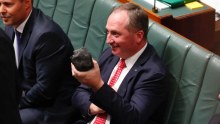5 ways we could make buying a house more doable
Updated
It's easy to see why young Australians might feel like they'll never catch up to rising house prices.
After all, a parliamentary inquiry spent almost two years looking into the affordability problem (/crisis) and came to the conclusion that there was nothing it could recommend.
But there are ideas out there. It's just whether or not they'd a) work and b) have any chance of actually being implemented given the political firestorm that erupts every time someone so much as mentions the words "negative gearing" or "assets test".
We've listed the pros and cons of some of the top suggestions, along with their likelihood of ever actually happening.
Taking mansions into account re: the pension
Pros:
Did you know you can live in a multimillion dollar beachside manor and still get the age pension?
That's because the family home is exempt from the assets test for this payment.
This means there's an obvious incentive for retirees to have as much of their wealth tied up in their home as possible... which means they could still be living in a big five-bedroom house when a two-bedder would be more suitable.
Removing the family home exemption (or making it only apply to less pricey houses) would get rid of this market distortion and put more of these houses up for sale, which would be a good thing for the younger people who want to buy them.
Cons:
It's not grandma's fault that the home she's owned since forever is now worth a fortune. And the whole point of removing the exemption would be to force her to sell up and relocate, essentially.
So it's about weighing this up against the fact that the oldies have all the houses (between 1982 and 2011, home ownership went down for every age group except over 65s).
Likelihood of this ever actually happening:
The Coalition Government says this would go against its principles. It's not on the agenda for Labor either.
Make negative gearing not a thing
Pros:
A big part of the reason why so many homes are owned by investors is negative gearing.
Basically, this allows investors to reduce their taxable income if they make a loss on their housing investments. So if they lose $10,000 over the course of a year, they can reduce their taxable income by that same amount.
It's pretty clear that getting rid of negative gearing would make investing in property less attractive, which would push down prices and free up more of the market for owner occupiers.
Cons:
The justification for negative gearing is that it increases housing supply and keeps the cost of rent down. According to the Grattan Institute, though, these are both myths.
However, what's definite is that getting rid of negative gearing wouldn't be popular with investors (and one in 10 taxpayers uses negative gearing).
Likelihood of this ever actually happening:
Labor went to the last election with a promise to limit negative gearing to new properties. The Coalition currently has no such plans.
Goodbye stamp duty, hello land tax
Pros:
If you don't have to pay stamp duty, you're thousands of dollars closer to being able to afford a house (though there are already first home buyer exemptions and/or concessions in all states and territories except Tasmania).
Stamp duty also makes the market less efficient by discouraging existing owners from moving house. So parents whose children have moved out might choose to hold onto their bigger home instead of getting a smaller one.
If stamp duty was replaced with a land tax, that would also encourage people who own empty plots of land to get a move on with their developments.
And there's another advantage to getting rid of stamp duty: in 2015, the Treasury released a paper which singled out stamp duty as the least efficient tax in Australia (that hypothetical land tax, meanwhile, would be the most efficient and actually contribute to economic growth).
Cons:
Stamp duty is a big revenue raiser for the states, so they'd need to make up the shortfall somehow (again, a land tax seems the most likely contender).
Likelihood of this ever actually happening:
This is a tricky one because stamp duty is a state tax. It's been suggested that the Federal Government could step in to help them transition to a land tax.
Tax mega estates and give young'uns the money
Pros:
A 35 per cent inheritance tax on estates worth over $10 million would raise at least $3.5 billion, according to the Community Council of Australia.
Last week Tim Ayres, the NSW Secretary of the Australian Manufacturing Workers Union, proposed that this could be used to give all young people a one-off payment when they turn 25 — which they could then use as a deposit for a house.
The idea of an inheritance tax isn't a new one either: America and Britain already have them.
Cons:
People could transfer their wealth (or part of it) before they die to avoid having to pay the tax, which would make the tax less effective.
Likelihood of this ever actually happening:
This isn't on the agenda for either the Coalition or Labor. But Mr Ayres says people in the ALP, of which he's a member, "are interested".
Just build more houses, duh
Pros:
This one is a no brainer when it comes to lowering house prices. That's because it deals with one of the fundamental reasons for why they cost so much in the first place.
This is the problem in a nutshell: If the number of houses available doesn't keep pace with the number of people who want houses, there's generally only one direction that prices will go.
But the reverse is also true. Build more houses and you put downward pressure on prices. That's why investors are being warned about what a possible glut of apartments could mean in Sydney, Melbourne and Brisbane.
Cons:
The problem is, there's really only so much land. That means you either have to build on undeveloped land (which tends to mean the outer 'burbs) or you have to build up (which tends to mean smaller apartments).
As well, city planners can't just open the flood gates. These things take... planning, to make sure new developments are sustainable and services will be up to scratch etc.
And of course, supply is only ever part of the problem. If investors are the only ones who can afford any of the new houses, well, that doesn't really help first home buyers.
Likelihood of this ever actually happening:
Supply is never not being increased. It's just a matter of whether it's increasing fast enough.
Topics: housing, housing-industry, australia
First posted







